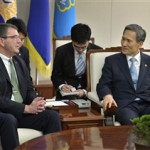Last week, Deputy Secretary of Defense Ash Carter visited U.S. allies in Asia, the latest emissary sent forth to reinforce the shift of U.S. military and diplomatic focus from the Middle East and Central Asia to the Pacific.
“We in the United States are currently embarked upon a great strategic transition as we turn the corner from a decade of necessary and very intense preoccupation on two wars of a particular kind in Iraq and Afghanistan, one that has finished, and one that will wind down to an enduring presence over the next two years,” said Deputy Secretary Carter during a speech in Indonesia on Wednesday. “We are turning that corner strategically and focusing our attention on the challenges and opportunities that will define our future.”
The visit presents a unique chance to look beyond orders of battle or seapower studies to understand the nature of U.S. global power today.
After the opening decade of the 21st Century, assumptions about enduring U.S. primacy have been dashed. America, once gain, must earn its leadership role in the world. Nowhere is this more true than in the Pacific, where China’s rising economic and military might offer the region an increasingly realistic alternative to the U.S.
Success economically, militarily and diplomatically in Asia requires a lot of work at home first. Reestablishing functional political relationships in Washington is imperative; so is sensibly managing a necessarily smaller Pentagon budget. Urgent issues in Washington, such as addressing the national debt, are also extremely important in Asia. China and Japan hold, together, to more than $2.37 trillion in U.S. Treasury securities, or 42% of the total owned by foreign holders. It is hard to find a better test if the U.S. can rise above disordered politicking.
Ably tackling the national debt, and other challenges to American competitiveness such as smartening up immigration policies toward the most skilled workers and improving U.S. engineering and science schooling, would help underpin the argument for continued leadership in the region. The U.S. needs to demonstrate the national will to make its own economy globally competitive and more productive while also fulfilling the basic tenets of an open and prosperous society. What we do at home matters abroad.
Time is short, yet patience is paramount. Success in Asia will be defined by strategic objectives and economic goals that will take years to achieve, not the tactical or incremental milestones, such as the killing or capture of individual people, that became so important to U.S. foreign policy during the past decade.
After Deputy Secretary Carter’s trip, more visits from top government officials are on deck. Secretary of State John Kerry will be heading to the region soon. What he has to say about how he views the nature of U.S. power and American competitiveness will go a long way toward making the case for continued leadership in the region.



